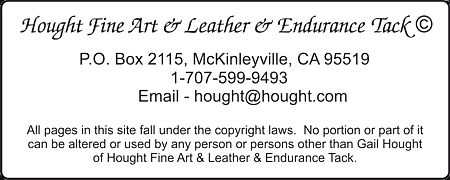|
1/04/03
READING
Learn to "read" your horse on
the ground and when mounted. You are already "reading"
but you may not recognize it as "reading". Here's an
example, "every time I ride him, he's just like a powder
keg." So, our job is to function as a sponge or a receptor
of signals sent by the horse.
As your "reads" are more and more correct, your horse
will improve, if you reward or correct, correctly.
What are some other ways to describe "read"? interpret,
listen, feel, anticipate.
Give yourself credit for what you are "reading" thus
far. Everything you "read" you have to "react
correctly immediately." Reward correct actions and "fix"
incorrect actions. So, where does the rider go wrong?
First by missing the chance to reward immediately, secondly,
by over or under correcting. This all takes lots of practice
and consistency from the rider. So, how do we know how much of
a reaction to give? Simple, only enough to reward or cause change.
An example might be as in a teeter totter. Two different sized
people are riding a teeter totter. How touchy is it to get the
board to balance flat? Only one person has to move slightly to
achieve balance.
So, the rider's job is to build a "chest" full of horsemanship
skills that are appropriate to use when needed. |
